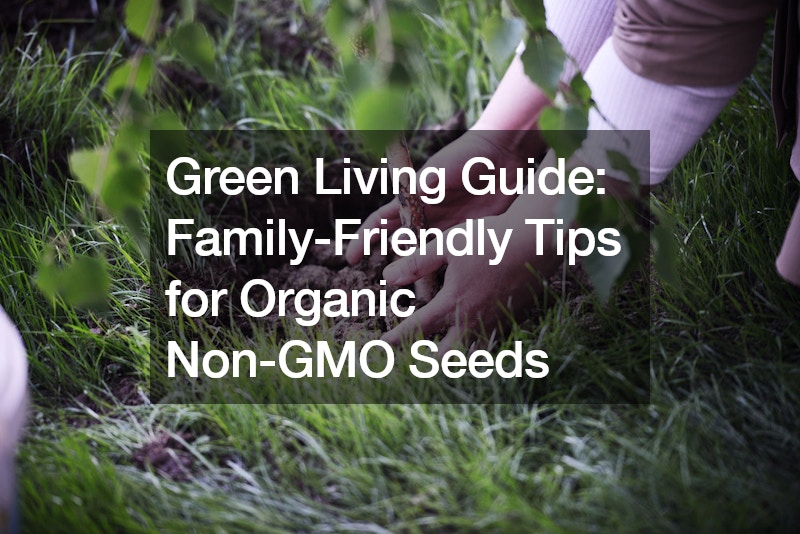In sustainable living, embracing organic non GMO seeds is a significant stride towards a greener lifestyle. Whether you’re a seasoned gardener or just starting, understanding the nuances of seed selection can pave the way for a thriving garden that benefits your family and the environment.
Selecting the Right Seeds
The sheer variety of seeds available can be overwhelming when delving into the gardening world. Terms like " heirloom," " hybrid," and "open-pollinated" often add to the confusion.
It’s essential to understand these categories’ distinctions to navigate this landscape effectively.
Understanding Seed Terminology
Organic Seeds: These seeds are sourced from certified organic farms. While the term "organic" is often associated with superior quality, it primarily denotes the farming practices used to cultivate the parent plants rather than the inherent traits of the seeds themselves.
Non-GMO Seeds: Genetically Modified Organisms (GMOs) have raised concerns recently, leading to a growing demand for non-GMO seeds. It’s essential to note that most seeds available for home gardening are inherently non-GMO. The term "non-GMO" primarily serves as a marketing label to reassure consumers concerned about genetic manipulation.
Heirloom Seeds: Heirloom seeds have a history, passed down through generations of gardeners. While there’s no strict definition of a heirloom seed, they are typically open-pollinated varieties preserved for their unique characteristics.
Hybrid Seeds: Hybrid seeds result from controlled cross-pollination between two plant varieties. While hybrids offer benefits such as increased vigor and disease resistance, they do not produce offspring with consistent traits, making them unsuitable for seed saving.
Factors to Consider
Climate and Growing Conditions: Select seeds adapted to your local climate and growing conditions to maximize success. Consider factors like temperature, sunlight, and soil composition when choosing suitable varieties for your garden.
Disease Resistance: Opt for seeds resistant to common garden pests and diseases. While heirloom varieties may lack the built-in resistance of hybrids, careful selection and cultivation practices can mitigate these challenges.
Maturity Date: Pay attention to the maturity date of the seeds, particularly in regions with shorter growing seasons. Choosing varieties with shorter maturation times ensures a bountiful harvest before the onset of adverse weather conditions.
Seed Saving Potential: To save seeds for future plantings, prioritize open-pollinated or heirloom varieties. Unlike hybrids, these seeds produce offspring with consistent traits, allowing you to maintain the desired characteristics across generations.
Supporting Local Growers
In addition to selecting the right seeds for your garden, consider supporting local seed producers and nurseries. By purchasing seeds from nearby sources, you reduce the environmental footprint associated with transportation and contribute to the resilience of local food systems. When prioritizing health within our families, the choices we make about the food we consume play a pivotal role. Opting for organic, non-GMO seeds benefits the environment and significantly contributes to our overall well-being.
Organic non-GMO seeds are cultivated without synthetic pesticides, herbicides, or genetically modified organisms (GMOs). This means they retain their natural integrity and are free from harmful chemicals and genetic alterations. You can reap many health benefits by incorporating these seeds into your family’s diet.
First and foremost, organic non-GMO seeds are rich in essential nutrients, including vitamins, minerals, and antioxidants. These nutrients support various bodily functions, boost immunity, and promote overall health. Whether adding seeds to your salads, smoothies, or baked goods, you’re infusing your meals with a powerhouse of nutrition.
Furthermore, organic non-GMO seeds are often fresher and more flavorful than their conventional counterparts. This freshness ensures you get the maximum nutritional value and taste from your food. Whether you’re enjoying the crunch of sunflower seeds or the nutty flavor of chia seeds, you’ll appreciate the superior quality and taste that organic non-GMO seeds offer.
Another health benefit of organic non-GMO seeds is their potential to reduce the risk of chronic diseases. Studies have shown that consuming organic foods may lower the risk of certain health conditions, including cancer, heart disease, and neurological disorders. You’re proactively choosing to safeguard your family’s health and well-being by choosing organic, non-GMO seeds.
Additionally, organic non-GMO seeds are free from genetically modified organisms, a topic of concern in recent years. GMOs are created by manipulating the genetic material of plants to exhibit specific traits, such as resistance to pests or herbicides. While proponents argue that GMOs can increase crop yields and reduce agricultural inputs, critics raise concerns about their potential long-term health and environmental effects.
You can avoid the potential risks of GMO consumption by opting for organic, non-GMO seeds. This is particularly important for families with children, as growing bodies are more vulnerable to the effects of harmful chemicals and genetic modifications.
In summary, incorporating organic non-GMO seeds into your family’s diet is a simple yet impactful way to promote health and well-being. From providing essential nutrients to reducing the risk of chronic diseases, these seeds offer many benefits for the whole family. By prioritizing organic and non-GMO options, you can make conscious choices supporting your family’s health and the environment.
.

